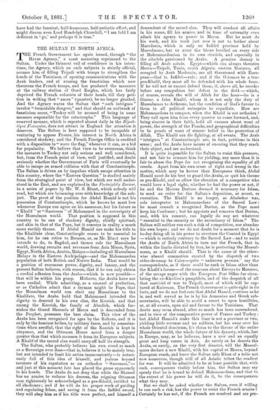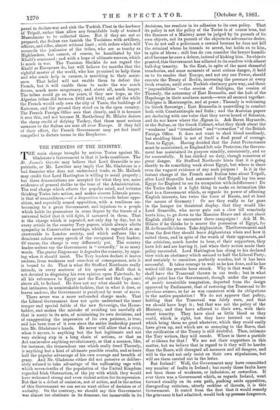THE SULTAN IN NORTH AFRICA.
THE French Government has again issued, through "the Havas Agency," a most menacing reprimand to the Sultan. Under the thinnest veil of confidence in his inten- tions, the Agency, which on such subjects is strictly official, accuses him of filling Tripoli with troops to strengthen the hands of the Tunisians, of opening communications with the Arab leaders, and of rousing the fanaticism which now threatens the French troops, and has produced the Massacre at the railway station of Oued Zargha, which has fairly deprived the French colonists of their heads, till they peti- tion in writing that " aman (quarter), be no longer granted. And the Agency warns the Sultan that "such intrigues" involve "formidable dangers," and that should an outbreak of fanaticism occur, "Turkey will be accused of being in some measure responsible for the catastrophe." This language of reserved menace, which is repeated almost daily in the Repub- lique Francaise, does not attract in England the attention it deserves. The Sultan is here supposed to be incapable of venturing to oppose France, his interest in North Africa is considered shadowy, and the French Foreign Office is credited with a disposition to" wave the flag," whenever it can, as a bid for popularity. We believe that view to be erroneous, think the menaces to Turkey not only serious and well considered, but, from the French point of view, well justified, and doubt seriously whether the Government of Paris will eventually be able to escape an armed collision with that of Constantinople. The Sultan is driven on by impulses which escape attention in this country, where the "Eastern Question" is studied mainly from the strategical point of view, but which are well under- stood in the East, and are explained in the Fortnightly Review, in a series of papers by Mr. W. S. Blunt, which nobody will read, but which are biimming over with knowledge of the sub- ject. The pivot of the position for Abdul Hamid is not his possession of Constantinople, which he knows he must lose whenever Europe can agree on his successor, but his future as " Khalif" or " Successor " of Mahommed in the sovereignty of the Mussulman world. That position is supposed in this country to be one of shadowy dignity, chiefly spiritual, and akin to that of the Pope, but it conveys in reality, a much snore earthly throne, If Abdul Hamid can make his title to the Khalifate clear, Constantinople ceases to be essential to him, for he can retire to Broussa, or, as Mr. Bina says he intends to do, to Bagdad, and thence rule the Mussulman world, drawing recruits and revenues from Asia Minor, Syria, Egypt, North Africa, Arabia, Malaya—including all Mussulman Malays in the Eastern Archipelago—and the Mahommedan population of both British and Native India. That would be a position of enormous power, dignity, and luxury, and the present Sultan believes, with reason, that if he can only obtain a cordial adhesion from the Arabs—which is now possible— that will be within his grasp. Hitherto, the Arabs have not been cordial. While admitting, as a counsel of perfection, or as Catholics admit that a layman might be Pope, that the Mussulman world can elect any Mussulman to the Khalif ate, the Arabs hold that Mahommed intended the dignity to descend in his own clan, the Koreish, and that among the Koreish, the family of Abadleh, which fur- nishes the Grand Shereefs of Mecca and is descended from the Prophet, possesses the best claim. This view of the Arabs has, been recognised for ages by the Sultans, and it is only by the heaviest bribes, by military force, and by assassina- tions when needful, that the right of the Koreish is kept in abeyance, and the Ottoman House saved from a danger greater than that which menaces it from its European subjects. A Khalif of the sacred clan would carry off half its strength.
The Sultan, who probably believes his own creed as much as a Sovereign ever does—that is, believes it to be mainly true, but not intended to limit his action inconveniently—is notori- ously full of this idea of himself, and jealous beyond measure of his reputation as an orthodox Successor,"— and just at this moment fate has placed the game apparently in his hands. The Arabs do not deny that while the Shereef has no armies to enforce his decrees, the reigning Ottoman may righteously be acknowledged as a pro-Khalif, entitled to all obedience ; and if he will do his proper work of guiding and regulating Islam, and saving it from the Infidel sword, they will obey him as if his title were perfect, and himself a descendant of the sacred clan. They will conduct all affairs in his name, fill his armies, and in time of extremity even admit his agents to power in Mecca. But he must do his work, and his work just now is not to bother about Macedonia, which is only an Infidel province held by Mussulmans, but to avert the blows levelled on every side at Mahommedanism in its own citadels, and especially in the citadels garrisoned by Arabs. A genuine dismay is filling all Arab minds. Egypt—which can always threaten Mecca—Tripoli, Tunis, south Algeria. eastern Morocco, all occupied by Arab Moslemin, are all threatened with Euro- pean—that is, Infidel—rule ; and if the Ottoman be a true pro-Khalif, they must all be defended with his whole force. If he will not or cannot defend them, if, above all, he recedes before any compulsion but defeat in the field — which, of course, reveals the will of Allah for the hour—he is a Giaour, a false Khalif, whom it is not only the duty of Mussulmans to dethrone, but the condition of God's favour to them in all political enterprise to repudiate. How are Mahommedans to conquer, when the Khalif is not orthodox ? They call upon him from every quarter to come forward, and, being sincere in their faith, hold all excuses about want of power, the strength of the Franks, and geographical difficulties to be proofs of want of sincere belief in the protection of Allah. The Khalif can die fighting, at all events. The Arab "intrigues" at Constantinople are, in fact, petitions in this sense ; and the Arabs have means of ensuring that they reach their object, and are understood.
It is quite impossible for the Sultan to resist this pressure, and not fair to censure him for yielding, any more than it is fair to abuse the Pope for not recognising the equality of all creeds. Apart from his own sense of right and wrong in the matter, which may be keener than Europeans think, Abdul Hamid must do his best to guard the Arabs, or quit his throne as pro-Khalif, and so allow the elevation of a competitor who would have a legal right, whether he had the power or not, if he and the Meccan Doctors deemed it necessary for Islam, to send an order for the Sultan's deposition, or arrest, or execution. The Khalif is no longer, as Abubeker was, sole interpreter to Mahommedans of the Sacred Law ; he must consult a recognised Doctor, as the Pope must keep his Confessor ; but he appoints and removes that Doctor, and, with his consent, can legally do any act whatever " essential to the security or the ascendancy of Islam." The Sultan will neither run such a risk of competition, nor abandon his own hopes ; and we do not doubt for a moment that he is to-day doing all in his power to overturn the Control in Egypt —which is entirely contrary to the Sacred Law---and to assist the Arabs of North Africa to turn out the French, that is, within the limits dictated by fear, he is protecting the Mussul- mans, as a Khalif should. That is the cause of the other- wise absurd commotion created by the dispatch of two aides-de-camp to Cairo—quite " unknown persons," say the correspondents, as if there could be rank in Islam other than the Khalif's favour—of the rumours about Envoys to Morocco, of the savage anger with the European Post Office for circu- lating the ex-Khedive's pamphlets,and of the despatch of all that mat&iel of war to Tripoli, most of which will be cap- tured at Kairouan. The French Government is quite right in its facts, and we do not feel sure that Abdul Hamid, cautious as he is, and well served as he is by his Armenian and Greek sub- secretaries, will be able to avoid a resort to open hostilities, or, at all events, open aid and favour to the Tunisians. That doubt may seem absurd, after so much has been surrendered, and in view of the comparative power of France and Turkey ; but Abdul Hamid's stake this time is not a province or two, yielding little revenue and no soldiers, but his sway over his whole Oriental dominion, his claim to the throne of the entire Mussulman world, the whole future of his dynasty, which, lost in Europe, may, as he believes, have a new and an equally great and long career in Asia. As surely as he deserts the Arabs, so surely, on the very first disaster, will the Mussul- mans declare a new Khalif, with his capital at Mecca, beyond European reach, and leave the Sultan only Khan of a tribe not now numerous, though still of all Asiatic tribes the readiest for war. It will be admitted to be at least possible that, with such consequences visibly before him, the Sultan may say openly that he is bound to defend Mahommedans, and that to the extent of his power he will do it, be the consequences what they may.
But we shall be asked whether the Sultan, even if willing to run such a risk, has the power to resist the French armies Certainly he has not, if the French are resolved and are pre- pared to declare war and sink the Turkish Fleet in the harbour of Tripoli, rather than allow any formidable body of trained Mussulmans to be collected there. But if they are not so prepared, the Sultan can furnish the Tunisians with artillery, officers, and rifles, almost without limit ; with orders which will reconcile the jealousies of the tribes, who are as touchy as Highlanders, but cannot, of course, be humiliated by the Khalif's command ; and with a hope of ultimate success, which is much in war. The Tunisian Sheikhs do not regard the Khalif as Europeans do, but will believe for months that the rightful master of the world, who has promised to help them and who sends help in cannon, is marching to their assist- ance. That belief will not enable them to defeat the French, but it will enable them to make the war much fiercer, much more sanguinary, and, above all, much longer. The tribes could go on for years, if they saw hope, as the Algerian tribes did between 1832 and 1842, and all the while the French would only own the city of Tunis, the buildings of Kairouan, and the ground they stood on in the open country. The French Foreign Office sees that clearly, and it is because it sees this, and not because M. Barthelemy St. Hilaire desires the cheap credit of defying Turkey, that these most serious menaces to the Sultan are sent all over Europe. If they fail of their effect, the French Government may yet feel itself compelled to dictate terms in the Bosphorus.































 Previous page
Previous page